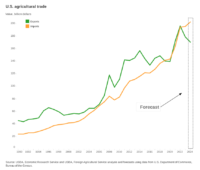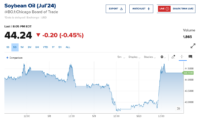“U.S. officials have stressed the need to compensate for the dramatic reduction in exports from Ukraine, which before Russia’s Feb. 24 invasion exported some 6 million tonnes of grain a month, mostly by sea. Now, vast amounts of wheat, barley, maize and vegetable oil are sitting in storage facilities and ports due to fighting, damaged infrastructure and a Russian maritime blockade.”
Wall Street Journal writers Vivian Salama and Bojan Pancevski reported in Saturday’s paper that, “Officials are also seeking solutions to get Ukraine’s growing stockpiles of grain moving again since full silos must be emptied ahead of the harvest. Kyiv has accused Russia of seizing Ukrainian grain, an allegation backed by the U.S. State Department, which sent cables to several governments in recent weeks urging them against accepting Ukrainian grain allegedly looted by Russia. Moscow denies the accusations.”
The Journal article added that, “Most Ukrainian exporters are now using railways to Poland to move their grain and other agricultural products, as well as the Romanian port of Constanta, according to officials and grain producers.”
David E. Sanger reported in Sunday’s New York Times that, “The leaders [meeting at the G7 summit in Germany, and then NATO, beginning Wednesday in Madrid] are also expected to spend significant time discussing global agriculture and how to increase the world’s food supply, as the war cuts off access to critical sources of nourishment for rich and poor countries alike. So far, Biden administration efforts to find a pathway out of Ukraine for its farm products have failed. Russia is doing what it can to tighten the noose, in what appears to be an effort to bring President Volodymyr Zelensky’s country to economic collapse.”
Eli Stokols reported on the front page of today’s Los Angeles Times that, “[G7] meetings Sunday focused on addressing impacts of the war — rising inflation, energy disruptions and worsening food shortages — as well as the rollout of a revamped infrastructure bank aimed at offering developing countries financing alternatives to China’s $4-trillion Belt and Road Initiative, which has been criticized for increasing corruption and violating labor, environmental and other standards.”
Meanwhile, New York Times writer Patricia Cohen reported in Saturday’s paper that, “The Russians’ bloody creep into Ukraine, a breadbasket for the world, has caused an upheaval in global grain markets. Coastal blockades have trapped millions of tons of wheat and corn inside Ukraine. With famine stalking Africa, the Middle East and elsewhere in Asia, a frenetic scramble for new suppliers and alternate shipping routes is underway.
“‘Because of the war, there are opportunities for Romanian farmers this year,’ [Catalin Corbea, a Romanian producer] said through a translator.
The question is whether Romania will be able to take advantage of them by expanding its own agricultural sector while helping fill the food gap left by landlocked Ukraine.
The Times article stated that, “In many ways, Romania is well positioned. Its port in Constanta, on the western coast of the Black Sea, has provided a critical — although tiny — transit point for Ukrainian grain since the war began. Romania’s own farm output is dwarfed by Ukraine’s, but it is one of the largest grain exporters in the European Union. Last year, it sent 60 percent of its wheat abroad, mostly to Egypt and the rest of the Middle East. This year, the government has allocated 500 million euros ($527 million) to support farming and keep production up.

“Still, this Eastern European nation faces many challenges: Its farmers, while benefiting from higher prices, are dealing with spiraling costs of diesel, pesticides and fertilizer. Transportation infrastructure across the country and at its ports is neglected and outdated, slowing the transit of its own exports while also stymieing Romania’s efforts to help Ukraine do an end run around Russian blockades.”
Cohen explained that, “When the bulk of the Romanian harvest begins to arrive at the terminals in the next couple of weeks, the congestion will get significantly worse. Each day, 3,000 to 5,000 trucks will arrive, causing backups for miles on the highway that leads into Constanta, said Cristian Taranu, general manager at the terminals run by the Romanian port operator Umex.”
Elsewhere, Bloomberg writers Abdel Latif Wahba and Tarek El-Tablawy reported on Sunday that, “Egypt plans to cut wheat imports by 500,000 tons per year, or about 10%, by eking out more subsidized bread from its grain, Supply Minister Aly El-Moselhy said.
“The move comes as one of the world’s largest wheat importers struggles with soaring commodity prices as a result of the Russian invasion of Ukraine. Egyptian officials are looking to boost their reliance on local wheat production in a bid to reduce the import bill.”
Dow Jones writer George Mwangi reported last week that, “Egypt’s wheat imports fell by 24% between January and May this year, compared with the prior-year period, the U.S. Department of Agriculture said late Wednesday.”
And Reuters writer Sarah El Safaty reported yesterday that, “Egypt has strategic reserves of wheat sufficient for 5.7 months, Supply Minister Aly Moselhy said in a news conference on Sunday, adding that the country has procured 3.9 million tonnes of wheat in the local harvest so far.”








